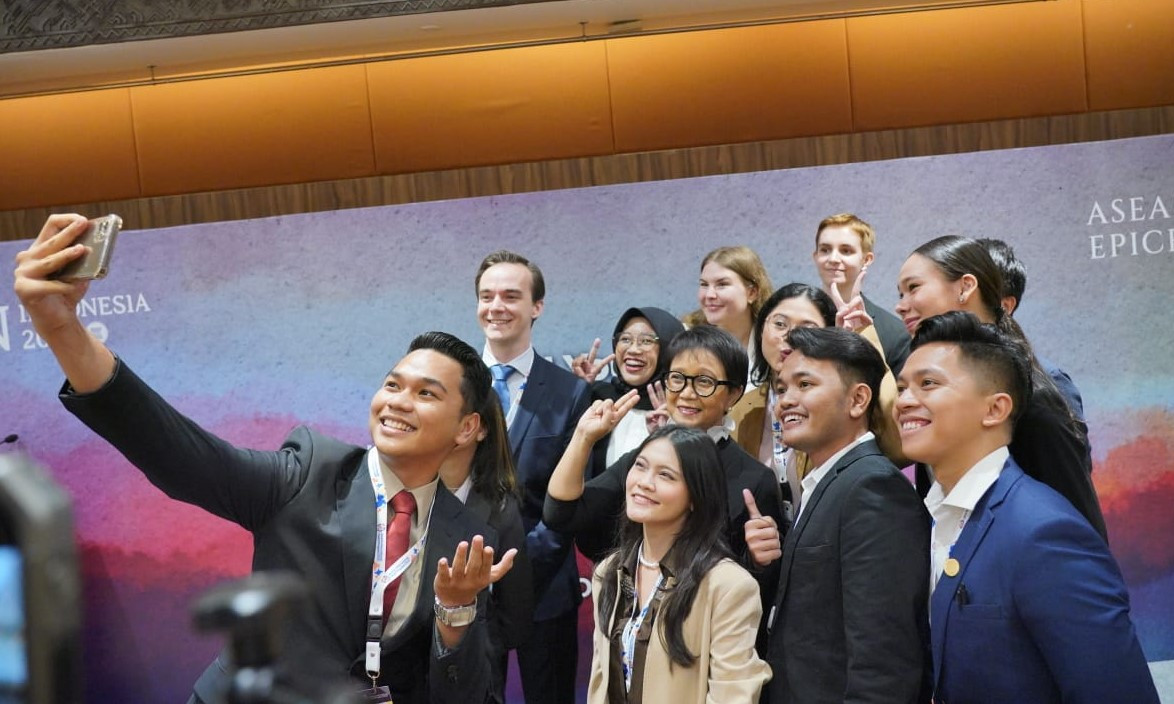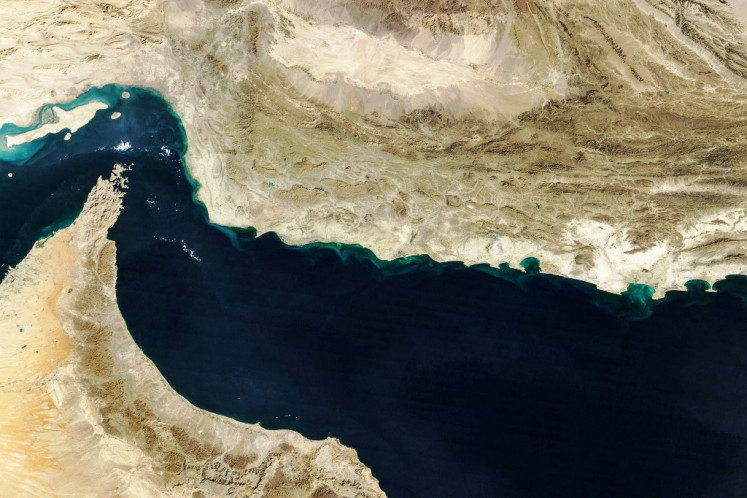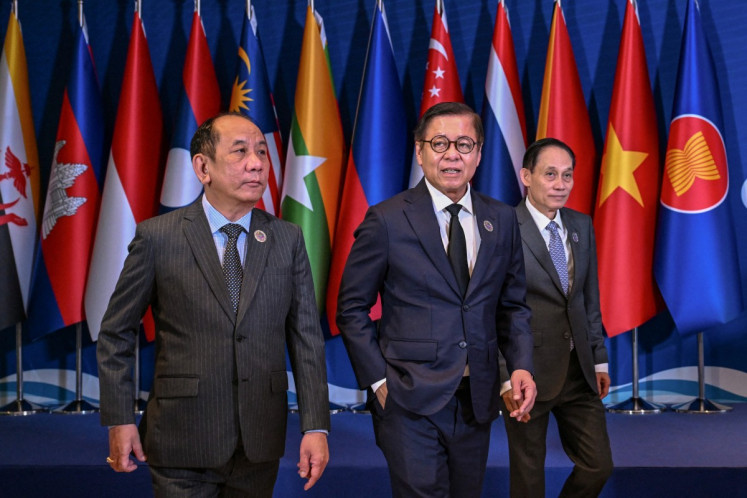Popular Reads
Top Results
Can't find what you're looking for?
View all search resultsPopular Reads
Top Results
Can't find what you're looking for?
View all search resultsA far-sighted vision for ASEAN’s future
Realistically speaking, we know that the upcoming ASEAN Summit will probably not offer any game-changing initiative.
Change text size
Gift Premium Articles
to Anyone
R
ecently I became disillusioned and frankly speaking, quite cynical about the future prospects of ASEAN and, unfortunately, I am not the only one.
Nations like Malaysia, Indonesia, Singapore and the Philippines and certainly Thailand with a more competent and fully legitimate government in place, should take the initiative in a big, transformative way.
In order to overcome the existing gloomy scenario, these nations have a serious responsibility.
They could come up with something bold that could shake up the bloc.
In this regard one option would be to use the High-Level Task Force on the ASEAN Community's post-2025 Vision to amend the ASEAN Charter.
Alternatively, they should come up with a new cooperative enhanced framework that could lay the foundations for a core nucleus of nations to move ahead and faster, even outside of the existing, dysfunctional official framework.
The first option has been the object of an analysis for Fulcrum by Ambassador Elizabeth Buensuceso who currently sits as the Philippines Eminent Person in the post 2025 Vision Taskforce.
Let us remember that the scope of this working group was this year broadened, quite correctly, up to 2045.
The expansion of the goals of the group was at the center of a recent piece written by Kavi Chongkittavorn, one of the most distinguished and astute regional observers.
The problem, as clearly set out by Chongkittavorn, is that ASEAN should do a much better job at engaging civil society to ensure the task force' s work can become not only more relevant but most importantly also more legitimate.
Also former Indonesian ambassador to the United States, Dino Patti Djalal, recently dived into the issue in an opinion piece for this newspaper.
ASEAN certainly needs a very different approach to involving and engaging youth and civil society. The problem is that the existing formal and informal rules governing the body and, very importantly, its organizational culture, will not allow such a shift.
Ambassador Buensuceso is right in advocating, though in a very mild way due to her ongoing official, role, for a change in the ASEAN Charter.
This could be one of the recommendations that the post-2025 task force is going to propose as it has been working on a report on strengthening ASEAN's capacity and institutional effectiveness.
Such a report should be the talk of the whole region rather than being ignored and becoming just a reference for some boring official declaration that no one cares to read.
But it is highly improbable that truly bold recommendations are going to emerge from a group of experts and senior officials who excel in knowledge of the issues discussed but lack political weight.
That is why this could be the last option for President Joko “Jokowi” Widodo and some of his peers, to come up with a truly transformative agenda for the next generations of Southeast Asians.
Realistically speaking, we know that the upcoming ASEAN Summit will probably not offer any game-changing initiative.
Will Timor-Leste be officially admitted? Will a new major plan on Myanmar will emerge? Will the leaders push for finalizing the terms of reference of the ASEAN Intergovernmental Commission on Human Rights? What about any plan to create a real regional parliament?
Nothing of this boldness will be discussed, much less approved, during the summit.
And yet President Jokowi with the support of Prime Minister Anwar Ibrahim of Malaysia and Prime Minister Lee Hsien Loong of Singapore could truly give prominence to a reform process being analyzed by the post-2025 taskforce.
A holistic and broad revision of the ASEAN Charter, not a cosmetic one but a real one, should be at the center of this reform agenda.
The governance of ASEAN can be drastically improved.
The way ASEAN communicates with its own citizens can be dramatically strengthened and the “We, the peoples” of the ASEAN Charter, should be given real substance because actually this document, even if it is always conveniently forgotten, makes democracy and human rights the cornerstones of the bloc.
“Adhering to the principles of democracy, the rule of law and good governance, respect for and protection of human rights and fundamental freedoms”, is what the preamble of the Charter says.
Lee Yoong Yoong, the community affairs director at the ASEAN Secretariat, in an opinion piece for the Bangkok Post, must be praised for the creative ideas put forward to revamp the bloc's image among the youth.
He “broke ranks” and came up with some practical but at the same time inspirational ideas and this is quite uncommon within ASEAN.
We need this type of thinking and level of ingenuity among ASEAN policymakers and Lee’s proposals to rekindle the new generations’ interest in ASEAN should really be given a chance.
Will anything of such a daunting nature and scope emerge this week at the summit in Jakarta? Probably not, unless President Jokowi and his most progressive peers, seize the momentum.
They could do so, and this is the second transformative option, with a multi speed process of regional cooperation.
A vanguard of nations could push ahead with a much more ambitious process, something not just focused on cooperation but also on integration.
This, as we know, is a methodology that has been very useful within the European Union to provide certain member states the option to forge higher and deeper forms of integration.
Some of the biggest European success stories like Schengen or even the monetary union were born out of this flexibility.
Such an option would also need a legal document, and a new charter that would pave the way for a truly transformative and inspiring vision.
This “out of the official framework” document could, possibly and hopefully, be embraced by the other members once (and if) ready.
The truth is that any post-2025 or 2045 vision documents are going to be, as per the existing mindset and mechanisms rooted within ASEAN, wanting and incapable of offering what the citizens of the region really need.
These could be the legacy that the “old guard” generation of statesmen of the region, should come up with. It is really up to President Jokowi, PM Lee, PM Anwar, to ensure a courageous, far-sighted vision for the future of the region.
They have, at their disposal, several paths available.
For one, they should really make the right call, even if it goes beyond the famous but ineffective ASEAN consensus.
After all, not only their legacy is at stake here.
***
The writer comments on social inclusion, youth development, regional integration, SDGs and human rights in the context of Asia Pacific.











